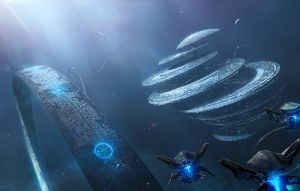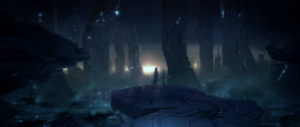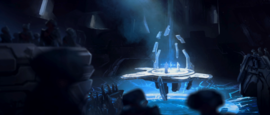Maethrillian: Difference between revisions
From Halopedia, the Halo wiki
m (Text replacement - "[Nn]ewcontent" to "New content") |
Sith Venator (talk | contribs) Tag: Reverted |
||
| Line 60: | Line 60: | ||
*''[[Halo: Fractures]]'' | *''[[Halo: Fractures]]'' | ||
**''[[Promises to Keep]]'' | **''[[Promises to Keep]]'' | ||
*''[[Halo: Epitaph]]'' | |||
==Sources== | ==Sources== | ||
Revision as of 00:45, February 27, 2024
"WE'VE GOT A NEW CONTACT, UNKNOWN CLASSIFICATION!" This article may contain information based upon upcoming, unreleased, or recently-released content from Promises to Keep, and may not be fully complete. Additionally, the information may be subject to change if it is based on pre-release material. Please update it as soon as any relevant and accurate material is available.
|
| Maethrillian | |
|---|---|

| |
| General overview | |
|
Description: |
A series of spiraling, circular platforms arranged around a central rod |
| Operation overview | |
|
Function: |
Administrative capital of the ecumene |
|
Attached AI(s): |
|
|
Date of construction: |
c. 122,990 BCE |
| Structural information | |
|
Diameter: |
100,000 kilometers (62,000 mi) (approx.) |
Maethrillian,[1] commonly known as the Capital, was the political center of the Forerunner ecumene. It housed the Ecumene Council, the main governing body of the ecumene, as well as the Capital Court. It was a massive structure, greatly exceeding the scale of even the Halo installations.[2][3]
History
Maethrillian was one of the oldest structures in the ecumene, having been constructed roughly around 122,990 BCE.[4] Unknown to most Forerunners in later times, the Capital was constructed around the physical component of the Precursor construct known as Abaddon, discovered by early Forerunners on a distant world. A powerful intelligence closely linked with the Domain, Abaddon was believed to have taught ancient Forerunners to access the Domain, which would later become a keystone of their civilization. As the construction of the Capital progressed, Abaddon was contained within a chamber of relics known as the Mysterium and held secret from most of the ecumene apart from senior members of the Ecumene Council; however, scattered reports of its existence gave rise to the legend of "the Organon", a Precursor artifact that controlled all others.[5]
Despite its immense size, the Capital itself had a comparatively small population of several hundred thousand Forerunners, mostly high-ranking Builders. Trillions of ancillas served in the capital in the Capital metarchy, an enormous network coordinated by a metarch-class ancilla that answered to the First Councilor.[2] It was one of the most trafficked locations in the ecumene, with constant security patrols, sentinels, and transports swarming around it.[2] Within five thousand kilometers of the structure, incoming vessels would be carefully screened by sensory fields and directed by hard light docking nets.[6] The Capital's system housed multiple slipspace portals that linked to many worlds, as well as the Ark.[7]
During the Forerunner-Flood war, Maethrillian became the site of an enormous battle as Mendicant Bias, having been persuaded into rampancy by the Primordial, attempted to deliver a crippling blow to the Forerunner leadership. Even though the Forerunners responded with heavy force, Mendicant Bias was successful in firing Installation 07 in the system, sterilizing the Capital and eliminating most of the Ecumene Council.[8] Although the Council would be reconstituted shortly afterward as the "New Council"[9] from survivors found deep within Maethrillian,[10] they would not return to the former capital.[5] With the Flood having overrun the Capital system, strategic command of the ecumene was moved to the greater Ark.[11]
Over a century after the Halos' firing, a group of surviving Forerunners led by the IsoDidact returned to Maethrillian to restore the Domain, which had been rendered inactive by the Halo Array. While attempting to access the Mysterium, the Forerunners were confronted by a manifestation of Abaddon. Embittered and corrupted by the damage wrought upon it by the Halos, the Precursor intelligence intended to judge the Forerunners for their sins. However, the Forerunners managed to enter the Mysterium and discovered Abaddon's physical location. Inserting a deadbolt key into the artifact, Growth-Through-Trial-of-Change successfully restored the Domain, simultaneously causing Abaddon to vanish while sacrificing herself. Their mission a success, the surviving Forerunners returned to Installation 00 and left the galaxy shortly afterward.[5]
Long after the Forerunner-Flood war, the Covenant learned about the existence of Maethrillian, revered as the fabled throne of their gods. In 2552, after an engagement with the UNSC, Supreme Commander Rho 'Barutamee found Forerunner artifacts that led him to believe he was close to finding Maethrillian. Ultimately, he arrived at Reach, which he attacked with restraint, preferring to localize important Forerunner artifacts first. However, he never accomplished his secret objective, as his plan was foiled by NOBLE Team, and the rest of the Covenant did not pursue his goal.[12]
Description
 This section needs expansion. You can help Halopedia by expanding it.
This section needs expansion. You can help Halopedia by expanding it.
Maethrillian was composed of a series of perfectly circular "platforms" arranged in a spiral along a central rod. These platforms decreased in size toward either end of the rod, with the widest central one being approximately 100,000 kilometers in diameter. Each platform was covered with a "city" of structures and buildings,[2] whose gravity was controlled individually by buffer fields.[13]
The Capital was home to the Council amphitheater, where the Ecumene Council engaged in debate on important matters. The amphitheater was suspended in midair, attached to the rest of the capital by bridges, anti-gravity gondolas, and lift tubes for individual Councilors. During Council proceedings, the amphitheater would be decorated with display spheres showing representations of the twelve original systems inhabited by early Forerunners, each carrying an epistle of the Mantle. Near the Council amphitheater, there was a hallway with its walls decorated with countless spent slipspace flakes, some of which had also been built into sculptures.[14]
The Crown
The Crown was the top platform of Maethrillian and was presumably used primarily for storage. During the attack on the Capital, the Crown was cracked in two.[5]
Defenses
In the event of a large-scale attack, the capital could rotate its sections to assume a spherical shape, thus protecting the structures atop each platform from damage. It also possessed powerful energy shields and a large defensive fleet. If the capital metarchy coordinating the fleet was compromised, the fleet would splinter into individual squadrons, each having specific instructions on how to deal with an attack.[15]
Trivia
The Capital is similar in design and function to the Citadel from the Mass Effect series. Both are large-scale artificial stations featuring inhabited cities, both serve as a center of galactic politics, and both are able to change their structure, closing themselves in the event of siege. However, the Citadel is only around forty-five kilometers long and thirteen kilometers in diameter, as opposed to the scale of the Capital, which is closer to that of a gas giant.
List of appearances
- Halo: Cryptum (First appearance)
- Halo: Primordium (Mentioned only)
- Halo 4
- Halo: Silentium (Mentioned only)
- Halo: Fleet Battles (Mentioned only)
- Halo 5: Guardians (Mentioned only)
- Halo Mythos
- Halo: Fractures
- Halo: Epitaph
Sources
- ^ Halo Waypoint: Forerunners
- ^ a b c d Halo: Cryptum, pages 280-281
- ^ Halo Waypoint, Cryptum Glossary (Retrieved on Mar 14, 2014) [local archive] [external archive]
- ^ Halo: Cryptum, page 296
- ^ a b c d Halo: Fractures, "Promises to Keep"
- ^ Halo: Cryptum, page 283
- ^ Halo: Cryptum, page 312
- ^ Halo: Primordium, page 272
- ^ Halo: Primordium, pages 373-374
- ^ Halo: Silentium, page 18
- ^ Halo: Silentium, String 25
- ^ Halo Waypoint: Rho 'Barutamee
- ^ Halo: Cryptum, page 304
- ^ Halo: Cryptum, page 293
- ^ Halo: Cryptum, page 311

